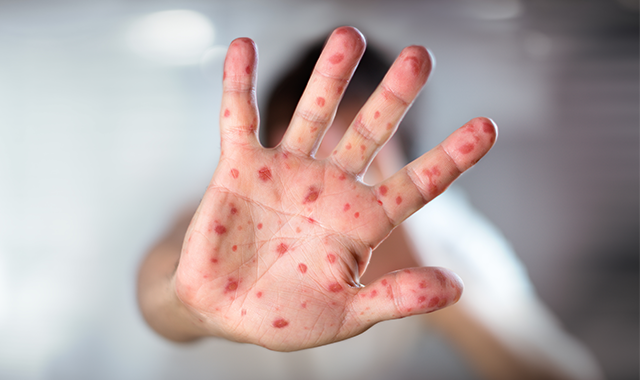How you can curb the measles outbreak
Four ways you can communicate the severity of the measles outbreak to your patients and protect your staff.

Measles is one of the most contagious infections. So far in 2019, there have been 1,148 confirmed cases of the measles in the United States. This is the highest rate of measles the country has seen in 25 years since the measles were declared eliminated in 2000.
Why then, after so many years, is measles making a comeback? This year’s initial cases have been traced to travelers who brought the disease back from other countries experiencing large outbreaks. The additional wave of cases can be attributed to a variety of factors that have been well-documented in national headlines.
Clinicians must remain resilient and do all they can to keep vaccination rates high and educate the public. One more vaccinated patient is one fewer who might catch the illness and further perpetuate an outbreak.
Once a neighborhood, school or community reaches a high concentration of unvaccinated individuals, it is only a matter of time before measles returns - and spreads widely, as has been seen in Washington, New York and Michigan. Physicians and healthcare providers who are at the forefront of care play a key role in impeding the spread of this infectious disease. Here are four ways you can help manage a measles outbreak:
1. Screen every patient
More than 90 percent of toddlers in the United States receive the measles vaccine. Still, you should ask that patients of all ages be screened. If patients cannot prove that they received proper vaccinations, or they are otherwise unsure of their vaccine status, it's important to order a measles titer (IgG). If their titers are high, they are protected; if they’re low, patients will need another dose of the measles, mumps, and rubella (MMR) vaccine. Immunity is the No. 1 way to prevent an outbreak.
2. Protect your patients
The measles virus can live up to two hours in the air where an infected patient has sneezed or coughed. Encourage patients who have visited hospitals or other high-risk environments to wear masks and try to stay clear of other patients, particularly children, who are most at risk of infection. Even simple signage in your practice to share these precautions can make a huge difference. Those with weakened immune systems are far more susceptible to catching an infectious disease. Be mindful of this as you welcome new patients into your facility.
3. Communicate possible outbreaks with patients and visitors
If you suspect your office has been compromised by an infected patient with a contagious disease, communicate this to all patients and staff as soon as possible. Providing clear, accurate and helpful information is crucial. While you do not want to initiate a sense of panic, it is essential to tell patients what symptoms to look out for, the correct treatment plan and if they need to go to the emergency department.
4. Familiarize yourself with the signs and symptoms of measles
Infectious diseases can present differently on each person. Sometimes, patients don’t “read the textbook.” Since there have been so few cases of measles and other infectious diseases, physicians may not have seen or treated patients with the actual disease before. Not every physician is an expert in dermatology and may not understand what the rashes or bumps might look like that are associated with with an illness such as measles. So, make sure you are aware of the ways diseases can present on all skin types and age groups.
The number of measles cases continue to rise in the United States and currently shows no sign of abating, despite the variety of public health official and local government efforts. It is more critical than ever to raise awareness about the dangers of measles and other infectious diseases.
Encourage patients, local health organizations and community members to do all they can to reduce the instances of new infections. We must all do our part to educate and inform those around us on the importance of vaccination and how effective the MMR vaccine has been for the last 50-plus years.
Read more: Measles outbreak toolkit for healthcare providers
Peter Alperin, MD, is vice president at Doximity, the professional medical network with more than 70 percent of all U.S. physicians as members. He is also a staff physician at the San Francisco Veterans Affairs Medical Center.
Newsletter
Optimize your practice with the Physicians Practice newsletter, offering management pearls, leadership tips, and business strategies tailored for practice administrators and physicians of any specialty.